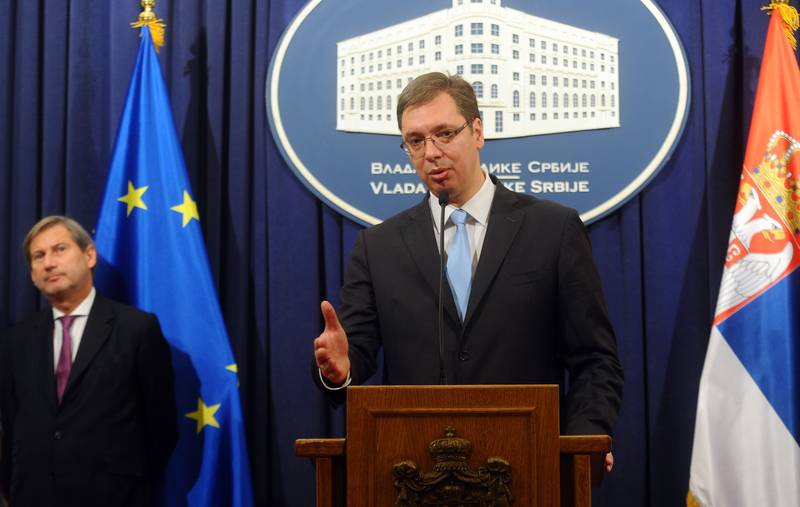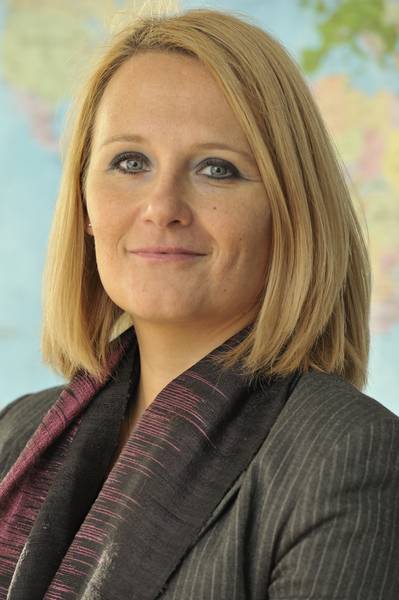Serbia and EU at War over Freedom of Speech
Adelina Marini, January 15, 2015
 While Europe was uniting and rising against the aggression on the freedom of speech with the attack against the French satirical magazine Charlie Hebdo, when 12 people were killed, a verbal conflict broke up between Serbia and the EU .... over the freedom of speech. The reason is an article [in Serbian] of the Balkan Investigative Reporting Network (BIRN), published last Thursday (7 January), which reveals that the state-owned company Serbian Electric Industry (EPS) granted a contract for renovation of the Tamnava mine to a consortium that has no experience at all in the field. The contract is also expensive. The Tamnava mine suffered severe damage during last year's floods in Serbia and the contract with Energotehnika – Juzna Backa is for the pumping of the water out of the shafts. According to the BIRN investigation, the consortium is linked to a very close ally of Aleksandar Vucic, the prime minister of Serbia.
While Europe was uniting and rising against the aggression on the freedom of speech with the attack against the French satirical magazine Charlie Hebdo, when 12 people were killed, a verbal conflict broke up between Serbia and the EU .... over the freedom of speech. The reason is an article [in Serbian] of the Balkan Investigative Reporting Network (BIRN), published last Thursday (7 January), which reveals that the state-owned company Serbian Electric Industry (EPS) granted a contract for renovation of the Tamnava mine to a consortium that has no experience at all in the field. The contract is also expensive. The Tamnava mine suffered severe damage during last year's floods in Serbia and the contract with Energotehnika – Juzna Backa is for the pumping of the water out of the shafts. According to the BIRN investigation, the consortium is linked to a very close ally of Aleksandar Vucic, the prime minister of Serbia.
On the next day, Friday, the premier reacted in his typical way - sharply and aggressively - to the publication calling the journalists from the Network "liars". "It's important the people [who published the investigation] to know ... They got their money from Mr Davenport [the head of the EU Delegation in Belgrade] and the EU to speak against the Serbian government", Mr Vucic said at a news conference. Such reactions against independent investigations and journalistic articles have become frequent during Victor Orban's rule in Hungary and are considered a patent of the Russian President Vladimir Putin. Both pronounced as "foreign agents" the non-governmental organisations that receive funding from abroad, whose sole purpose is to destroy the government. The reaction of the Serbian prime minister, whose country has the ambition to become a member of the EU by 2020, but has huge problems to resolve including geopolitical ones, caused stupor in Brussels.
The spokeswoman of the EU high representative for the foreign and security policy, Maja Kocijancic, said that she is strongly surprised by the claims of the Serbian prime minister that the EU pays certain organisations to conduct a campaign against the government. "We strongly reject these baseless claims. The EU stands by independent and courageous journalism and freedom of speech across Europe and beyond. Freedom of expression is a basic principle of democracy. In its endeavour to support freedom of expression, the EU, among other actions, provides financial grants to independent and non-government organisations throughout the region on a competitive basis and following strict procedures. All grantees have full editorial independence and are solely responsible for the content of published material. The EU expects the Serbian authorities to ensure an environment supporting freedom of expression and of media", the official statement of Federica Mogherini's spokesperson reads.
On the day when millions gathered on the Republic square in Paris to stand against the attempts to limit the freedom of expression, Mr Aleksandar Vucic responded saying that he, too, was surprised by Maja Kocijancic's claims. "Serbia supports the independent and courageous journalism as well as the freedom of speech across Europe and beyond and that freedom of expression is a basic principle of democracy. This is precisely why I am blank by the fact that Maja Kocijancic is trying, in the name of EU, to silence me, to ban me to even respond to questions of journalists", said the prime minister. He went further by asking Kocijancic and Michael Davenport, the EU Delegation chief, whether they forbid the prime minister of Serbia to answer journalistic questions and whether they are trying to forbid him to inform the Serbian public that "those whom you pay do not speak the truth" and "that freedom of expression and truth is not allowed to us, the ordinary mortals".
In conclusion, he said that he truly believes in the EU values but does not believe that hypocrisy and lies are a value worth fighting for. Serbia continued the offensive in the next days too. In media was broadly quoted Serbia's place in the global press freedom index of Reporters without Borders, according to which Serbia has a significant progress. This was heavily criticised [in Serbian] by the Independent association of journalists (NUNS) and the Independent society of journalists in Vojvodina (NDNV) who attacked the state-owned news agency Tanjug. It is claimed that Tanjug published a year-old story about Serbia's progress in terms of media freedom. The two associations say that it is symptomatic that this news appears precisely at the time when "Aleksandar Vucic, in the most rude way, attacked the BIRN journalists, which is in any case one of the indicators about the freedom of media in Serbia".
 As euinside recently wrote, it is a fact that Serbia is indeed going up with huge steps in the Reporters without Borders index. In 2013, it jumped up by 17 seats to rank 63 and last year (2014) Serbia went up another 9 ranks and is now 54th. To compare, neighbouring Croatia is ranked 65 in 2014 which was stressed by the Serbian media in the context of the fact that in the EU there are countries which are worse than Serbia. Bulgaria last year dropped to its lowest level in a decade - 100. It is the lowest ranked EU member state. The index for 2015 is not published yet, so, at this stage, the ranks from 2014 are still valid.
As euinside recently wrote, it is a fact that Serbia is indeed going up with huge steps in the Reporters without Borders index. In 2013, it jumped up by 17 seats to rank 63 and last year (2014) Serbia went up another 9 ranks and is now 54th. To compare, neighbouring Croatia is ranked 65 in 2014 which was stressed by the Serbian media in the context of the fact that in the EU there are countries which are worse than Serbia. Bulgaria last year dropped to its lowest level in a decade - 100. It is the lowest ranked EU member state. The index for 2015 is not published yet, so, at this stage, the ranks from 2014 are still valid.
In its report on Serbia's progress toward EU membership, however, published last October, the European Commission notes deterioration of the media situation in that country. "There are concerns about deteriorating conditions for the full exercise of freedom of expression" in Serbia. About the factual lack of freedom regularly speak some media in Serbia itself as this website wrote many times. The problems with the media environment not only in Serbia but in all countries from the enlargement process to the Western Balkans were the main issue during the hearing last autumn in the subcommittee on human rights in the European Parliament.
As part of the verbal exchange between Serbia and EU were also statements on behalf of Premier Vucic like "I will never be a puppet" or Aleksandar Vulin's, a minister in the government, according to whom "no one has the right to command Premier Vucic but the citizens of Serbia". It is indicative that Prime Minister Vucic was not among the more than 50 heads of state or government in Paris who took part in the unity march in solidarity with the freedom of expression. Among those present were the prime ministers of Hungary and Bulgaria whose countries have serious problems with the freedom of speech and expression. Serbia was represented by its first Deputy Prime Minister and Minister of Foreign Affairs Ivica Dacic who said that "the attack against the freedom of speech is an attack against the whole society". The problem with the different comprehension of the freedom of speech in Serbia and EU could prove another serious impediment for Serbia's European integration together with Kosovo and the relations with Russia.
 Bakir Izetbegovic, Andrej Plenkovic | © Council of the EU
Bakir Izetbegovic, Andrej Plenkovic | © Council of the EU Aleksandar Vucic, Recep Tayyip Erdogan | © Serbian Presidency
Aleksandar Vucic, Recep Tayyip Erdogan | © Serbian Presidency Jean-Claude Juncker, Zoran Zaev | © European Commission
Jean-Claude Juncker, Zoran Zaev | © European Commission